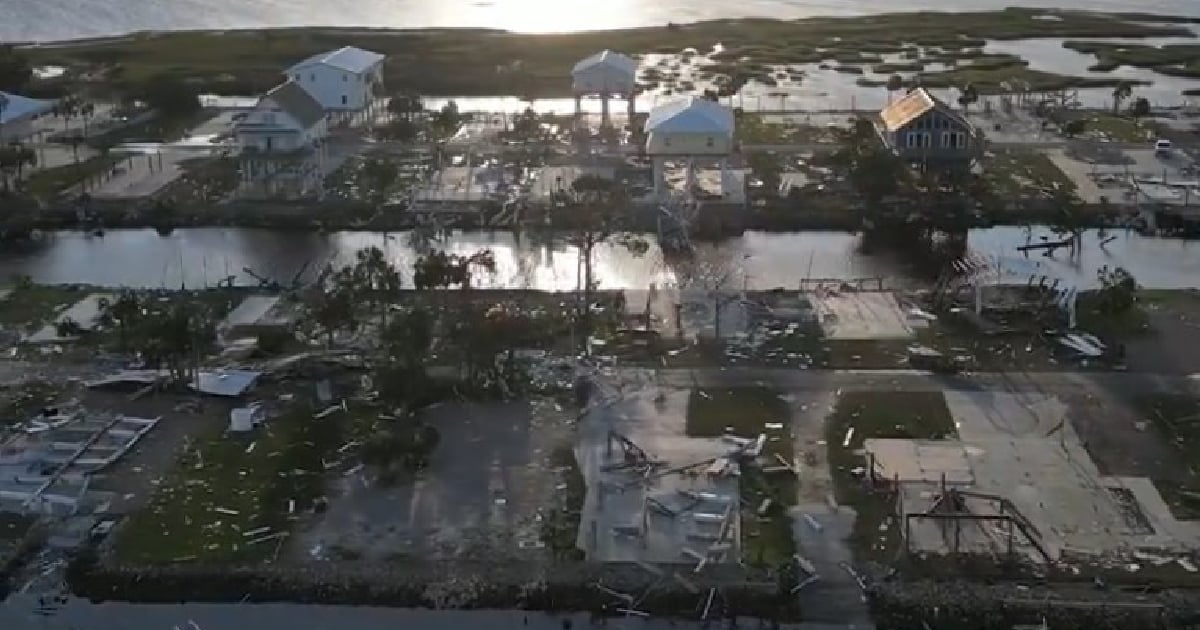
Nearly 90 deaths have been confirmed in the United States as a result of the impact of the devastating Hurricane Helene, which has caused significant destruction throughout southeast Florida and other states in the country, according to reports released this Sunday.
The torrential rains from the powerful hurricane caused severe flooding and left thousands of people stranded, without shelter and waiting to be rescued, while millions remain without electricity, both in southeast Florida and in the states of North and South Carolina and Georgia, according to a report by the AP news agency.
So far, at least 89 deaths have been reported in five states: North Carolina (36), South Carolina (24), Georgia (17), Florida (11), and Virginia (1), according to a report from CNN. Meanwhile, there are numerous reports of missing persons amid communication outages.
At least one-third of the people died due to fallen trees. Among the 11 confirmed deaths in Florida, nine people drowned in their homes in a mandatory evacuation area on the Gulf coast, reported Sheriff Bob Gualtieri.
Meanwhile, at least 24 deaths have been reported in South Carolina, making Helene the deadliest tropical cyclone for the state since 1989, when 35 people lost their lives after Hurricane Hugo made landfall north of Charleston, AP reported.
Helene made landfall on Thursday night in the Big Bend region of Florida as a category 4 hurricane, with winds of 225 km/h (140 mph).
However, none of the reported fatalities are from Taylor County, where the storm made landfall. The hurricane entered near the mouth of the Aucilla River, about 30 kilometers (20 miles) northwest of where Hurricane Idalia struck in 2023, with similar strength.
Subsequently, it quickly advanced through Georgia and, now weaker, flooded the Carolinas and Tennessee with its torrential downpours, overflowing streams and rivers and straining reservoirs.
Many people were displaced from their homes following Hurricane Helene in Pinellas County, on Florida's central west coast, said the county's Director of Emergency Management, Cathie Perkins, in a press conference this Sunday.
The governor of Georgia, Brian Kemp, said on Saturday that "it looks like a bomb has gone off," after seeing from the air splintered homes and roads covered in debris.
In Atlanta, 28.24 centimeters (11.12 inches) of rain fell in 48 hours, the highest amount recorded in the city since historical records began in 1878.
The western part of North Carolina was isolated due to landslides and floods that forced the closure of about 300 roads. Part of the city of Asheville was under water.
Helene caused the worst flood in a century in that state, which was described as "catastrophic" by Governor Roy Cooper. Search and rescue teams from 19 states and the federal government came to help.
Officials from Buncombe County in North Carolina have received over 1,000 missing persons reports through an online form, said the county administrator, Avril Pinder, this Sunday.
In eastern Tennessee, the rescue of patients and staff from a hospital in the rural county of Unicoi was dramatic, as they were airlifted from the roof of the medical center.
However, at least 73 people remained unaccounted for in that county, authorities reported at a press conference on the morning of this Sunday.
U.S. government declares disaster for Florida and North Carolina.
President Joe Biden said this Saturday that the devastation caused by Helene has been "overwhelming" and pledged to send aid.
According to AP and NBC News, the president approved a declaration of major disaster for Florida in order to provide aid to the areas affected by Hurricane Helene, according to a press release from the Federal Emergency Management Agency (FEMA).
Residents in 17 Florida counties, including Pinellas, Hillsborough, and Manatee, will be able to receive funding as grants for temporary housing or home repairs and loans for uninsured properties, the agency said.
This Saturday, Biden also approved a disaster declaration for North Carolina, making federal funds available to the victims.
The president said in a statement this Sunday that he is in "constant contact" with local and state authorities to provide resources to the communities affected by Helene.
"While we continue to support response and recovery efforts, we will ensure that we spare no resources to ensure that communities can quickly begin their path to reconstruction," Biden wrote on social media platform X, adding that he and Jill Biden are praying for those affected.
Meanwhile, more than 2.5 million households and utility companies, from Florida to Virginia, remain without electricity, reported PowerOutage.US.
Most of the customers without power - more than 924,500 - live in South Carolina, while more than 685,000 in Georgia and just over 554,600 in North Carolina remain in the dark.
In Florida, more than 230,600 are without electricity, and nearly 138,000 in Virginia.
The risk rating agency Moody's Analytics predicts that the material damages caused by Helene in the U.S. will be between $15 billion and $26 billion. However, according to preliminary estimates by AccuWeather, total damages and economic losses in the country would be around $95 billion to $110 billion, AP reported.
Helene is the eighth named storm of the 2024 Atlantic hurricane season, which began on June 1 and ends on November 30. The National Oceanic and Atmospheric Administration (NOAA) has forecasted an above-average season this year due to record ocean temperatures.
* Summary compiled from information from AP, NBC News, Telemundo, and CNN.
What do you think?
COMMENTFiled under: